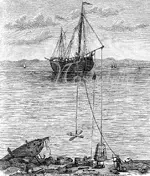Colombiapictures
Hero Member
- #1
Thread Owner
Wrecking is an important part of the history of the Bahamas.
I am trying to find enough information about it, to write a book.
Snippets, stories, evidence, books, newspaper articles and cuttings, location of documents etc.
Snippets like:
"When we happened on the shipwreck, it was evident that no wrecking had been done on it for many years. About 10 intact bronze portholes were just lying there, where they had fallen when the hull rotted. These would have picked up by the first wrecker who set his eyes on them. We found evidence that the ship had burned, maybe sunk because of fire on board."
This kind of info gives valuable clues that help finding more information about the shipwreck and sometimes help identifying the origin of the ship. Sometimes, with a lot of work, one is even able to find the name and date of the ship and its history. In short, one can re build the whole story of the shipwreck.
Any help is much appreciated.
I am trying to find enough information about it, to write a book.
Snippets, stories, evidence, books, newspaper articles and cuttings, location of documents etc.
Snippets like:
"When we happened on the shipwreck, it was evident that no wrecking had been done on it for many years. About 10 intact bronze portholes were just lying there, where they had fallen when the hull rotted. These would have picked up by the first wrecker who set his eyes on them. We found evidence that the ship had burned, maybe sunk because of fire on board."
This kind of info gives valuable clues that help finding more information about the shipwreck and sometimes help identifying the origin of the ship. Sometimes, with a lot of work, one is even able to find the name and date of the ship and its history. In short, one can re build the whole story of the shipwreck.
Any help is much appreciated.




